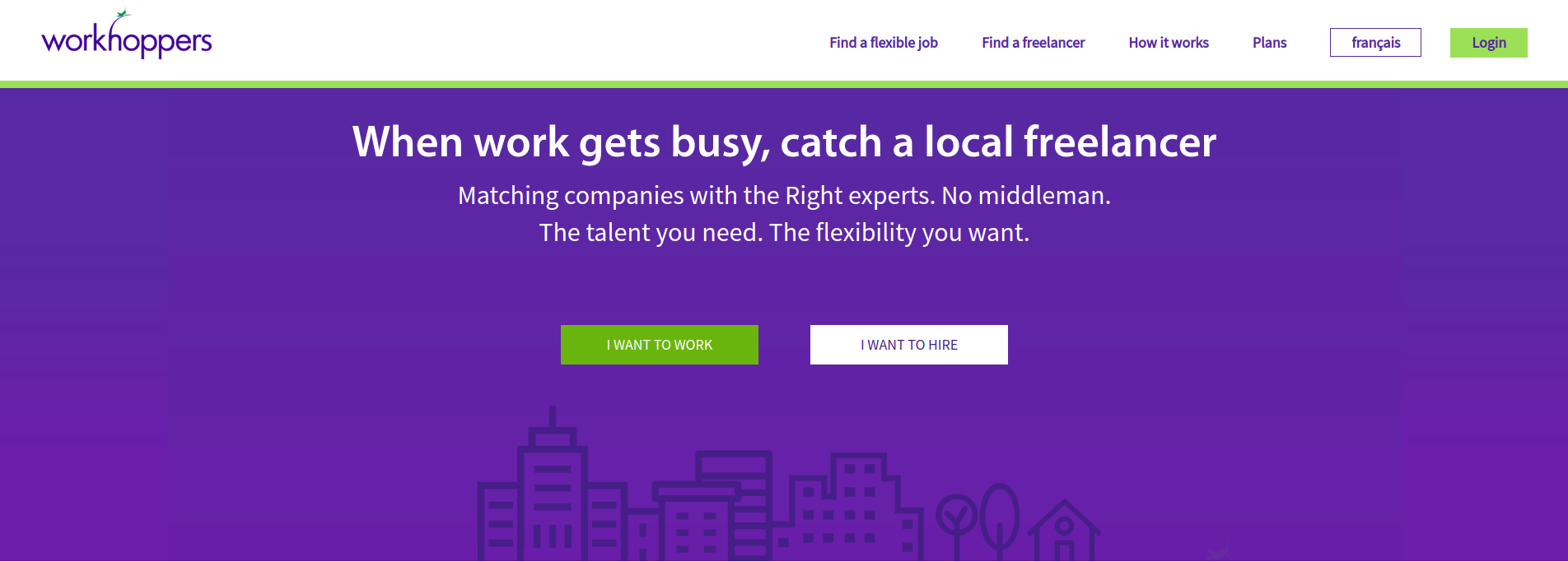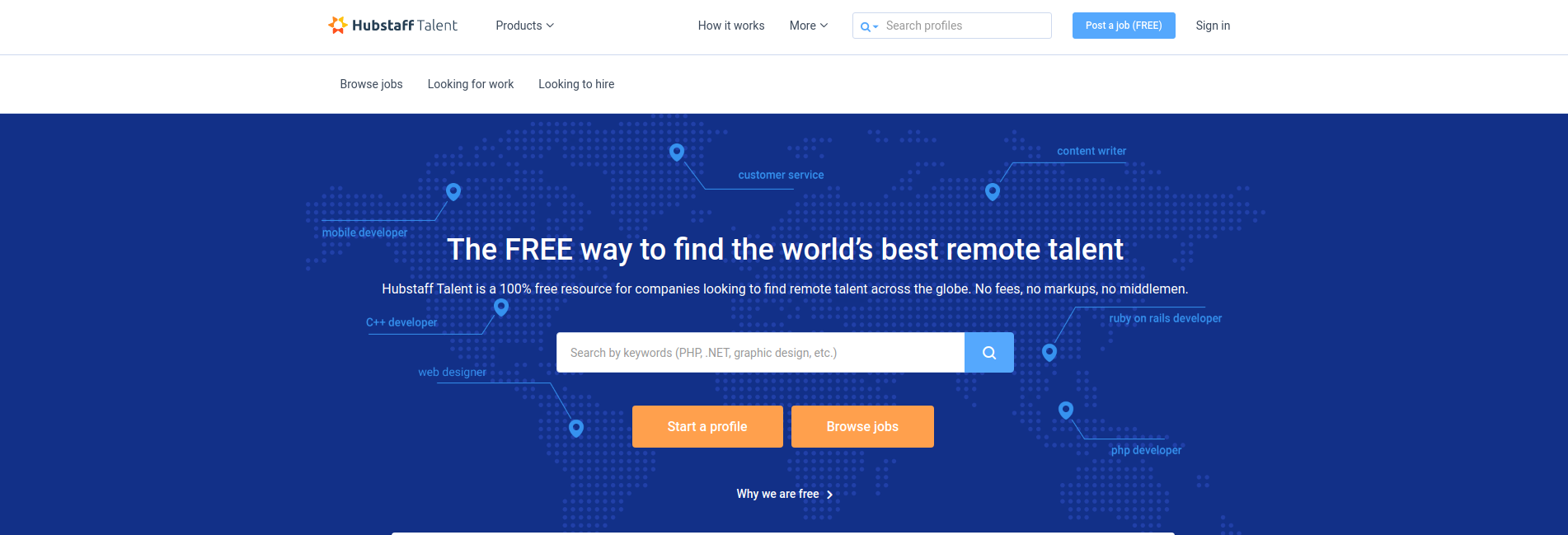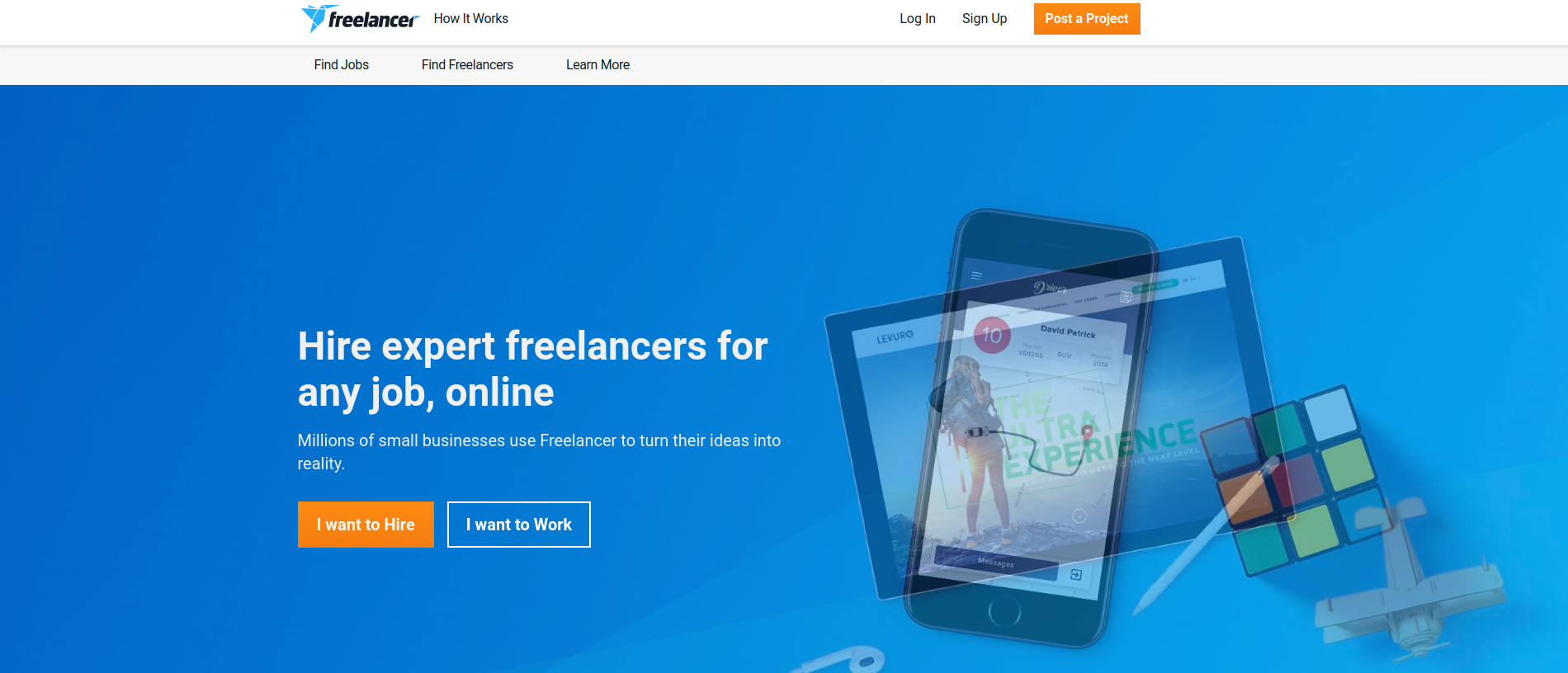We live in an age of gig economy, which means that numerous freelance developers and dev teams offer their services through specialized platforms.
Companies that don’t need in-house development teams can significantly cut their expenses by outsourcing their development efforts. But, even companies that need website development services frequently can also benefit from hiring remote developers. Instead of limiting their choices to those living in their area, it’s possible to tap into a huge talent pool and find the right people for the job from all around the world.
All these factors have contributed to the popularity of hiring remote employees. According to surveys, 30% of employees report that they’re working remotely full time, while 18% of them work remotely one to three times a week.
In order to connect a huge workforce and companies looking for remote employees from different areas, platforms like Upwork have been created.
However, although it’s an obvious and the first choice of many employers and remote employees, you should take its competitors into consideration when hiring remote website developers.
This article will list 7 best Upwork alternatives and see how they stack up against each other.
What is Upwork?

Formed by merging of oDesk and Elance, Upwork, a freelance marketplace, has managed to stand out among the other platforms for hiring freelancers and remote workers thanks to its massive user base. Namely, there are 12 million registered freelancers and 5 million registered clients.
The number of registered users is its main selling point, as it’s possible to find freelance professionals in an array of different fields as well as with various levels of experience.
However, this fierce competition, paired with high fees, and the fact that there are tons of projects that aren’t exactly trustworthy, make Upwork a less than ideal option for many experienced and talented website developers and other professionals.
Other smaller freelance marketplaces boast more affordable fees as well as a more detailed vetting process, both of which are of crucial importance to those who look for a job and those who offer remote work positions alike.
1. Fiverr

This marketplace offers digital services in more than 250 categories, which means that you can easily find your remote website development team here. Its name comes from the idea that services start at $5 and go up to hundreds and thousands of dollars.
Fiverr has a different business model than Upwork. Instead of the later’s bidding process, Fiverr acts as some kind of a freelance directory based on a number of categories and subcategories.
Freelancers are called “sellers,” while those who hire them are called “buyers.” Every buyer and seller receive reviews from those they work with, and these ratings allow both parties to choose whether they want to hire or work for a certain seller/buyer.
This platform is great if you’re looking for someone to complete a project relatively quickly and within a limited budget. However, if you’re wondering, for example, how to build an online shopping mobile app and whether it’s Fiverr that you should use to hire a remote developer, it’s a good idea to trust only vetted professionals with such a complex project.
Pros:
- It’s easy and free to set up an account
- No bidding system
- It’s easy to find and communicate with potential sellers
- If you want a simple task done quickly and affordably, Fiverr is the place to go.
Cons:
- Sellers don’t undergo a vetting process
- Fake reviews can make it difficult for buyers to know whether the candidate they pick will deliver 100%. Although many sellers offer a money-back guarantee, the loss of time can b
2. Workhoppers

If you’re more inclined to hire remote website developers who you can meet up with and have a face-to-face conversation over a cup of coffee, Workhoppers is the platform of your choice. The point is in building long-term professional relationships with freelancers in your own community and achieving high-quality collaboration.
All the companies are checked before they can post their ads on the platforms. There is no commission fee, just an affordable monthly plan.
Using this platform, you can find website developers who work in your area. Instead of hunting down the perfect developer for the job, or waiting for them to apply for the position, Wokhoppers’ algorithm is going to match you with a list of potential candidates who are available for contract, full time, or part-time roles. The algorithm will highlight the ones who are the most qualified for the position, so you don’t have to do that by yourself.
There are no complex actions you need to take on Workhoppers – you can reach out potential candidates directly and negotiate the terms of the employment. When their work is complete, you can review the collaboration with the freelancer.
Pros:
- Perfect for projects that require face-to-face collaboration
- A great algorithm matches you with the best candidates
- No commission fees
Cons:
- You have access to local talents, not a global pool
- If you’re working in an area with higher living costs, freelancers you hire will charge you more
3. Hubstaff Talent

Hubstaff Talent allows you to hire website developers or any other remote workers, anywhere around the globe, for free.
The platform shows designers’ hourly rate, experience, skills, availability, resume, as well as the languages they speak. Agencies can have their own profiles too, and add their team members.
To find the candidates that fit your requirements, you need to run a directory search. You can filter the results using candidates’ locations, years of experience, skills, or availability, or you can use a keyword or a phrase.
Once you’ve found your potential candidates, you can contact them directly, interview them, and make further business arrangements.
Since no fees are involved, Hubstaff Talents doesn’t play a significant role in pairing businesses and candidates, nor their agreements.
There are no fees or markups on both sides, just a monthly fee that starts at $5 for a single user per month. For an additional fee, you can take advantage of Hubspot’s project management software – Hubspot Tasks, as well as their time-tracking software with an invoicing solution.
Pros:
- It has no fees or markups on both sides
- You can choose between agencies and individuals
Cons:
- Since Hubspot Talent is the newcomer in the market, it offers a smaller selection than Upwork
4. Freelancer

Besides Upwork, Freelancer is one of the most popular gig platforms.
With more than 42 million registered users, you will have a large number of potential candidates of all skill levels, when searching for your new remote website developer.
Signing up is quick and easy for prospective employers. You can either browse the directory and directly contact freelancers you find adequate, or post a project, and let freelancers bid on it.
When posting a project, try to give as many details as you can, list the skills and requirements for the position and your pricing options.
You can then review the portfolios of freelancers who bid on your project, check out their qualifications and their experience.
Freelancer gives you an option to pay safely using their Milestone Payment System when you’re satisfied with the work done. You can release a part of the payment when a particular benchmark is met, or pay upon completion of the entire project.
Pricing of Freelancer varies and can range between $3 or 3% of the entire project, depending on which sum is greater. Freelancer also offers a time tracking tool, but it’s not free to use.
When the work is complete, you can leave the review of your remote worker. However, keep in mind that they’re also able to review you.
Pros:
- It’s straightforward to post a project
- There is a massive pool of candidates to choose from
- You pay when you’re satisfied
Cons:
- A complicated bidding system
- It’s a bit more pricey than Upwork
5. PeoplePerHour

With almost 2.4 million registered freelancers, this platform allows businesses and individuals to hire remote workers on an hourly basis.
While PeoplePerHour operates in a similar manner as Upwork – you post a project and those who are qualified and interested in working for you can apply and bid on it.
However, there’s another way to find a remote developer for your next project – you can take advantage of popular request at a fixed price. Freelancers are those who define these fixed prices, also known as hourlies.
These different arrangements allow even companies that are strapped for money to find the most cost-effective solution and opt for the one that suits them.
Another similarity with Upwork is a strict vetting process. Namely, PeoplePerHour checks all those who offer their services via this platform, meaning that you can be sure that your next remote hire is an expert. Moreover, there’s another layer of security as the community and other clients also get to review people they collaborate with.
Pros:
- Setting up an account is free
- Hiring a remote worker doesn’t incur any fees, but when you’ll be charged when you’re making payment with your debit/credit card or PayPal
- Posting a job is free
- Browsing hourlies is also free
Cons:
- Commission fees can be higher than Upworks – 3.5%
- The interface isn’t very intuitive
6. Outsourcely

The additional value Outsoucely brings to the remote job market, as the freelancers there are most commonly looking for long-term remote work opportunities.
With only a monthly plan and no commission fees, you can use the platform to search and browse over 400,000 reliable and competent freelancers. There are various filters to narrow down your search, such as work availability, desired salary, previous experience, location, language, internet speed, etc.
You can also post an ad for the job, and only review those who are interested in the position.
The platform uses an algorithm that will put the most qualified and active candidates at the top of your search results.
When you find the ones you think could match your requirements, you can use a built-in instant messenger or browser-to-browser voice and video calling feature for interviewing purposes, making the whole selection and hiring process much easier.
If you opt for Outsourcely, you can hire your remote developers directly, and pay them using whatever channel you’ve agreed upon. You can be sure that your remote employees will be satisfied, as they will receive 100% of their total salary, without any deductions from their paycheck.
Furthermore, Outsourcely has its own Team Workplace platform, which you can use to manage your remote. Plus, if you want to use it as a single management tool, you can invite your existing workers to join.
Pros:
- Reliable freelancers who are looking for long-term opportunities.
- A great algorithm that matches you with the most qualified candidates
- No commission fees
- Employees receive their full salary
Cons:
- A convoluted verification process
- A low job volume
7. Guru

With around 3 million freelancers available for hire, Guru doesn’t have as large community as Upwork, but it offers other advantages that are worth taking into consideration.
This platform is pretty useful for smaller companies that don’t have big budgets as it allows you to find remote workers from all around the world – which means that you can tap into the market in which developers charge less.
Since it comes with a Slack add-on and a Chrome extension, it’s easy to communicate with your remote dev team as well as access your account information easily.
Another good thing about this platform is the way the information is organized into so-called collections, boards, and individual cards so that you can have control over your account.
Pros:
- Freelancers are verified
- There’s the SafePay payment option that protects both parties
- There’s a time-tracking options that allows clients to track the activity of their remote employees
Cons:
- No live chat option or a phone number – just an “Answers” message board
- A complicated billing system
- High transaction fees
As you can see, there are numerous other freelance platforms other than Upwork that you can check out and find the one that fits your budget and requirements best. For those of us without the time or expertise to hire and manage a team member direct, I recommend a service like Devteam.space for hiring a custom developer. If you choose the freelance model, It is a good idea to go through this list and make a comparison of the features that matter the most to you.
